 Petzlover
Petzlover French Bulldog is originated from France but Greyhound is originated from United Kingdom. French Bulldog may grow 41 cm / 16 inches shorter than Greyhound. French Bulldog may weigh 26 kg / 57 pounds lesser than Greyhound. Both French Bulldog and Greyhound has almost same life span. French Bulldog may have less litter size than Greyhound. Both French Bulldog and Greyhound requires Low Maintenance.
French Bulldog is originated from France but Greyhound is originated from United Kingdom. French Bulldog may grow 41 cm / 16 inches shorter than Greyhound. French Bulldog may weigh 26 kg / 57 pounds lesser than Greyhound. Both French Bulldog and Greyhound has almost same life span. French Bulldog may have less litter size than Greyhound. Both French Bulldog and Greyhound requires Low Maintenance.
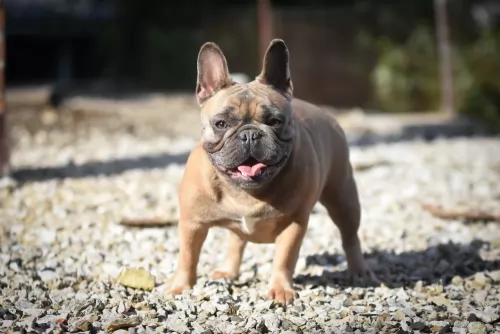 The french bulldog originated in England and are bred expecting small size bulldogs. Many lace workers in Nottingham had little bulldogs and when they emigrated to france, they brought their dogs with them. Soon they become popular in France and Europe. Then Americans showed interest in them.In 1896 frenchie was shown in United states in a show and after that they got their nickname "Frechie".
The french bulldog originated in England and are bred expecting small size bulldogs. Many lace workers in Nottingham had little bulldogs and when they emigrated to france, they brought their dogs with them. Soon they become popular in France and Europe. Then Americans showed interest in them.In 1896 frenchie was shown in United states in a show and after that they got their nickname "Frechie".
 The Greyhound belongs to a group of dogs known as sighthounds. This is an ancient sighthound breed dating back a few thousands years.
The Greyhound belongs to a group of dogs known as sighthounds. This is an ancient sighthound breed dating back a few thousands years.
The dog has been bred for racing but today is also a popular pet. They’ve also been used for hunting too because of their keen eyesight and sense of smell.
In the United States there are Greyhounds registered with the American Kennel Club as well as those registered with the National Greyhound Association.
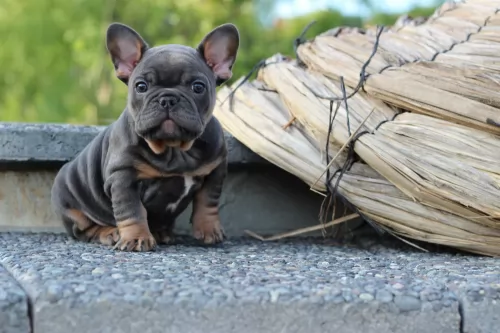 Frenchie is a good companion dog and has a powerful muscular body. They like to play but also likes to relax for more time. They are intelligent and training them is very easy until they think it a game. They are free thinkers and are not very good in obedience. Frenchies should not be leaved alone for a long time.They love spending time with humans and generally they get along with everyone. They are excellent watchdogs and alerts when strangers come.
Frenchie is a good companion dog and has a powerful muscular body. They like to play but also likes to relax for more time. They are intelligent and training them is very easy until they think it a game. They are free thinkers and are not very good in obedience. Frenchies should not be leaved alone for a long time.They love spending time with humans and generally they get along with everyone. They are excellent watchdogs and alerts when strangers come.
French bulldog suits very well in apartments. But they should be made to walk for fifteen minutes daily to avoid over weight. They should not be kept outside on hot days. Frenchies will be very happy if you stay in home. They will follow you wherever you walk inside the house. They love people so much, such that people who own a Frenchie can not imagine life without them.
 The Greyhound is a tall, muscled, long-legged, slender dog with a flexible spine, a deep chest and exceptional eye sight.
The Greyhound is a tall, muscled, long-legged, slender dog with a flexible spine, a deep chest and exceptional eye sight.
The Males are usually about 71 to 76 cm in height with the females being slightly smaller. The dogs weigh in the region of 27 to 40 kg. The coat of the dog is short and smooth and is found in an assortment of colors, from fawn to white, tan, black and brindle.As far as grooming goes, he is looked upon as a low maintenance breed.
He has a long narrow muzzle, semi-erect/semi-floppy short ears and a long slender tail.
Sometimes referred to as being hypoallergenic, you need to allow your Greyhound indoors as the dog doesn't have an undercoat. He is therefore more susceptible to extreme temperatures. The face is long, narrow and pointed, the ears short and half-erect-half-floppy with a long, thin, whip-like tail.
Intelligent and gentle, the Greyhound is described by those who have owned them as wonderful pet. They are somewhat aloof around strangers but love their own human family. This is a non-aggressive, gentle, docile, calm dog. They are loving and get on well with their entire family, whether human beings or pets.
They’re sensitive dogs who appreciate quiet, calm environments. They may be quiet, but they are still social, loving the company of their family. They’re not great barkers and because they are non-aggressive, they don’t make wonderful guard dogs.
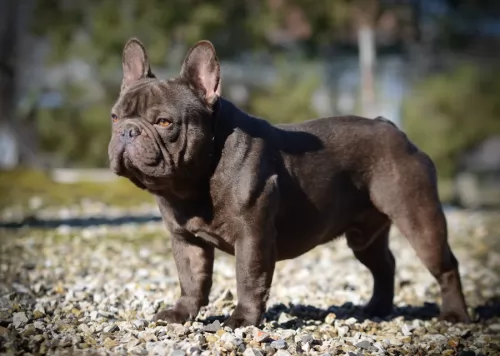 They are good children friendly dogs as they like to play with them. It will be good if they are supervised by an adult.
They are good children friendly dogs as they like to play with them. It will be good if they are supervised by an adult.
They are polite with everyone including other pets. They love to play games and chase balls but don't need much exercise.
Frenchies adapts well for apartment living but they don't like being alone for long time. They will not tolerate both hot and cold weather and so air conditioning will be better.
French Bulldogs are easy to train and are very much interested in playing.
 The Greyhound, forgetting about the racing part, makes a superb pet too. He won't do well in a household where there are screaming, noisy children and adults as he wants a quiet home to live in.
The Greyhound, forgetting about the racing part, makes a superb pet too. He won't do well in a household where there are screaming, noisy children and adults as he wants a quiet home to live in.
He can get on well with kind, gentle, respectful children as well as with pets in the home. Just like any dog, he will also need training and socialization as this can build up his confidence and then he knows how to please his owners and what they expect.
The Greyhound will require a gentle, fair, kind owner who understands his need for peace and quiet, and then he becomes a most wonderful devoted, loyal and loving pet.
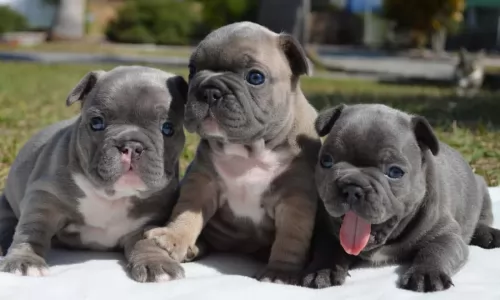 Frenchies can suffer from Von Willebrand's disease(VWD)and thyroid condition. Due to their flat faces they suffer from elongated soft palate or cleft palate. Because of their compacted air way they have inability to effectively regulate temperature.
Frenchies can suffer from Von Willebrand's disease(VWD)and thyroid condition. Due to their flat faces they suffer from elongated soft palate or cleft palate. Because of their compacted air way they have inability to effectively regulate temperature.
Any indication that the hair is unhealthy, such as brittleness and hair loss, should be addressed immediately to avoid any further damage. Hair loss becomes a problem when it becomes excessive, possibly due to disease or a particular condition.
 Greyhounds are a wonderfully healthy dog breed and with good care can reach 14 years of age. They aren't prone to many genetic illnesses and unlike so many other dog breeds, this is one dog that doesn't battle with hip dysplasia – in fact it is almost unknown among this tall, slim dog breed.
Greyhounds are a wonderfully healthy dog breed and with good care can reach 14 years of age. They aren't prone to many genetic illnesses and unlike so many other dog breeds, this is one dog that doesn't battle with hip dysplasia – in fact it is almost unknown among this tall, slim dog breed.
The Greyhound does however, have a deep chest and this is what makes him vulnerable to bloat or gastric torsion. You have to take action quickly if you detect bloat – the stomach swells up – as this is a life-threatening condition that can occur quickly when air is trapped in the stomach. The stomach can become twisted.
Make sure your Greyhound doesn't gobble his food too quickly and preferably give him smaller meals as opposed to one or two large bowls of food.
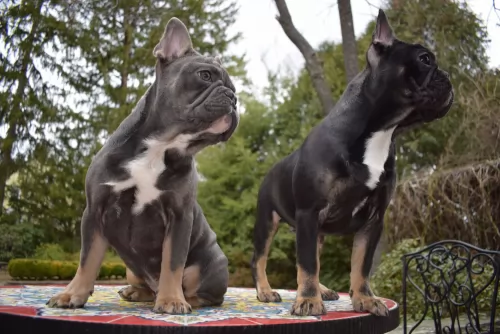 As with all dogs, proper nutrition makes your French Bulldog a happy, healthy pup. He should have his own food and water bowls. Don't feed your French bulldog puppy, uncooked meat or food that may have gone bad. Young puppies need relatively large amount of food in order to meat the demands of their rapidly growing bodies and their hectic lifestyle. Feed your puppy specially designed chewing treats from reputable pet stores.
As with all dogs, proper nutrition makes your French Bulldog a happy, healthy pup. He should have his own food and water bowls. Don't feed your French bulldog puppy, uncooked meat or food that may have gone bad. Young puppies need relatively large amount of food in order to meat the demands of their rapidly growing bodies and their hectic lifestyle. Feed your puppy specially designed chewing treats from reputable pet stores.
According to the French BullDog Club of America, there are no specific guidelines for feeding them. Options for feeding your French Bulldog are commercial dry food, canned food, raw food and homemade meals. Calories required for frenchie varies depending on size, age, activity level and metabolism.
Frenchies can be made to walk or run for a particular distances. Heavy exercises should not be given as they face respiratory problems. Avoid exercising them in hot weather as they have chances of getting heatstroke.
 Your Greyhound’s breeder will be the best guide for the type of- and the amount of dog food your hound will need. Of course, a growing puppy has different nutritional needs from a mature or senior Greyhound.
Your Greyhound’s breeder will be the best guide for the type of- and the amount of dog food your hound will need. Of course, a growing puppy has different nutritional needs from a mature or senior Greyhound.
Growing puppies and young dogs use a lot of energy so they will require a diet rich in protein. According to Greyhound experts, an adult Greyhound dog will need an average daily caloric intake of 1740 calories.
Older dogs and those that have been spayed or neutered will need less. Apart from the very best quality kibble, your Greyhound will most certainly require raw meat from time to time. You can also give him some cooked chicken, vegetables and brown rice. He should have access to a constant supply of fresh, cool water.
The Greyhound's coat is smooth and short and he sheds very little so he will only need a gentle brush-down once or twice a week.
Having a relaxed lifestyle is what your Greyhound will love. He is a dog that needs to spend time indoors. When outdoors, whether you live in the city or the country, he will need daily walks and a run in the park regularly.
Just because he is a sprinter, it isn't wise to take him with you with cycling or jogging as he is geared for a short burst of speed as opposed to a long run.